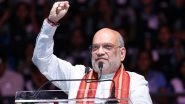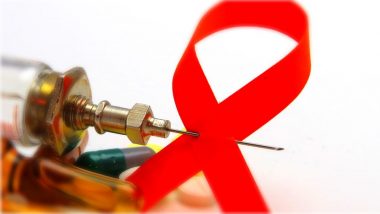New Delhi, November 30: The government has run several programmes, hundreds of NGOs have created awareness about HIV/AIDS, yet there remains a significant gap when it comes to people living with HIV (PLHIV) getting the right treatment, largely because of the persisting stigma and a lack of knowledge.
On the eve of World AIDS Day, experts said apart from the government it was also up to the PLHIV themselves to tell their stories to encourage more number of affected people to come out and receive treatment.
This would also help uproot the stigma, they added. Mona Balani, a PLHIV activist working with 'India HIV/AIDS Alliance', said that while awareness about the condition has "definitely increased" over the past few years, several PLHIV continue to be deprived of proper medical help and care. World AIDS Day 2018 Theme ‘Know Your Status’: 4 Reasons Why People Don’t Get Tested for HIV.
"Around 12 lakh people across country are receiving treatment, but there are approximately 25 lakh affected people, so we need to reach out to the remaining 13 lakh and tell them how important it is to get proper treatment.
"So our first effort should be enabling people to come forward. There is a reason why I am able to speak about the issue today. I had to put in a lot of efforts, but I was trained and offered a platform to tell my story. There have been thousands before me who did not have the courage," Balani told PTI.
Firoz Khan, a PLHIV working with Delhi-based NGO National Coalition of People Living with HIV in India (NCPI+), said that it was appreciable what the government was doing with the help of civil societies but unless a person living with HIV speaks up, these would all be "half efforts".
He added that the image of an PLHIV in people's mind is still that of a sickly person, in a hospital bed with tubes attached to him, but they need to know HIV positive people are nowhere different from others.
Diagnosed at the age of 17, Khan has been active with the NGO in spreading awareness about HIV/AIDS since. He is also pursuing a law degree at Delhi University simultaneously.
When his college batch-mates learnt about his condition from a newspaper article in 2015, he registered a change in their behaviour. While they were still sitting and talking with him, the "us and they" reaction was evident.
"At the same time I felt if it had happened some years ago they would have outcast me, now it is not that harsh a reaction. Earlier my colleagues wouldn't eat with me, now it is not like that. But the stigma is still there," Khan said. He added that people's responses are gradually changing, they are more accepting now, and there is a conversation happening.
According to National AIDS Control Organisation's recently released HIV Estimation report for 2017, adult HIV prevalence in the country is at 0.22 per cent, with 0.25 per cent in males and 0.19 per cent in females.
"The adult HIV prevalence at national level has continued its steady decline from an estimated peak of 0.38 per cent in 2001-03 through 0.34 per cent in 2007, 0.28 per cent in 2012 and 0.26 per cent in 2015 to 0.22 per cent in 2017," the central organisation noted in its report.
Sharing an example from her life, Balani said that after opening up about her status on social media, she started receiving frantic calls from friends, who wanted to know how long she had left to live.
"Their reaction was completely different from what I am living with. They want to know how long will I live, but nobody wants to know how I am living with it right now. "Such pressure from the society also discourages PLHIVs from revealing their status," she said.
People, she added, were aware that it didn't spread by contact, yet they were scared for themselves, and such hostility has kept many PLHIVs from making their status known.
While NGOs and the government running programmes in tandem to spread awareness and increase prevention of HIV/AIDS cases, eminent human rights activist and founder of Naz Foundation Anjali Gopalan expressed displeasure saying "prevention activity is not happening at the scale it should be happening".
"Care has just collapsed into treatment, people need more than just treatment and medication when we are talking about care. This approach is very problematic," she said.
Gopalan added that prevention programmes should also include voices about discrimination faced by PLHIV. "Our prevention programmes don't really talk about the discrimination, if you don't have a strong prevention programme that's exactly what's going to happen. Also, we need to have strong laws which protect people from such discrimination.
"Discrimination also exists because of lack of knowledge, because it is predominantly a sexually transmitted disease and people tend to be extremely judgemental of them. Unless we deal with this attitude, we cannot deal with the discrimination," she said.













 Quickly
Quickly


